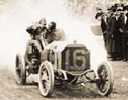Russell's Ramblings
by Russell Jaslow
First Step
5/29/10
Rochester, N.Y.—I'm eating lunch on a Saturday afternoon the day before what was once the most important sports day in my life, watching the 1971 Indianapolis 500 airing on ESPN Classic. This was the race as a young child I first heard the radio broadcast, catching the waning moments as Al Unser (no senior necessary at the time) became the first driver to win back-to-back since Bill Vukovich. Al Unser became an instant favorite of mine.
The following year, I missed the race entirely, but when I heard Mark Donohue had prevented Al Unser from doing the still impossible three-peat (of course, that term was never heard back then), I instantly disliked Donohue, becoming my least favorite driver. It wasn't until I got older, and started racing myself in the Sports Car Club of America, did I realize how revered Donohue was (and rightfully so) especially in the sports car community. Hey, what did I know as a kid back then? I have since changed my attitude.
1973 was the first year I sat down ready to listen to the entire broadcast and then watch it that evening on ABC. Of course, we all know what happened that year and how long it took to run barely half the distance.
However, I was hooked, and my racing fandom revolved around the Month of May culminating in the running of the Indianapolis 500. I hung onto every word of the radio broadcast in my bedroom, keeping complete race charts. Later in the day, my family knew there was no stopping me from commandeering the only TV (black and white) in the house for the shortened to two-hours tape delayed coverage.
Of course, that all came to an end when a particular man-boy threw a temper tantrum of historical proportions, the results of which will be a case study taught in business schools for decades to come.
Some interesting tidbits are coming out of this 1971 broadcast that one takes for granted as time marches on:
- For a trouble free car, it took only three pit stops to finish the race.
- A slow pit stop was in the 28 second range.
- None of the pit crew wears helmets or fire suits.
- Lap times, in both the race and qualifying, are slower than what NASCAR is running there today (of course, just a few short years later, 200 mph laps were being approached).
- Virtually all of the driver uniforms were simply white, though some have a solitary stripe (ironically, Al Unser's suit is blue).
- David Letterman, yes the David Letterman, was a pit reporter.
- All the reporters from Jim McKay to Jackie Stewart to Chris Economaki and even to future funnyman Letterman, were professional, knowledgeable, and objective in their jobs, unlike the announcers of today, especially Jack Arute, who's fawning to the point of a not so hidden stalker-like love affair with Danica Patrick is downright disgusting, which leaves him the laughing stock of the press room. (And nobody asked any driver, "What are your emotions?")
Before this repeat showing was over, I switched to CBS to watch the highlighted coverage of last week's American Le Mans Series event in Laguna Seca. The irony of watching a present year's racing event on a tape delayed basis 39 years after we were subjected to that treatment for Indy is not lost on me.
The real question is, why did I not continue to watch the end of the 1971 Indy 500 for nostalgic purposes? The answer is simple -- I have never, ever allowed myself to get caught up in the "good old days" mentality. That's certainly not to say I don't like and appreciate history especially of my favorite sport. Anyone who knows me knows I love auto racing history as my Auto Racing History site shows as does my strong support of the International Motor Racing Research Center at Watkins Glen.
However, studying and enjoying history is different than allowing ones self to get trapped in history and the altered sense of reality that behavior can cause. The world moves forward, and I have every intention to move along with it. Right now, ALMS is the only series in North America that captures the technological advances, meaningful relationships back to a road car, variety of chassis, engines, and tires, cars being pushed hard with breathtaking racing, and for the top teams, true driving talent is required and compensated. Many attributes Indy car racing used to have.
Can Indy car racing ever return to the stature and significance it held in 1971? Only time will tell. However, the new CEO, Randy Bernard, made a significant move. A move that had nothing to do with rules, technology, or drivers.
A few months ago, I thought if I had to give one piece of advice to the new CEO coming in from completely outside the sport, it would be to get rid of the name Indy Racing League (IRL). I'm not saying this to sound smart. Anyone with half a brain (and I got to think I have at least that much) who follows this sport knows the only way Indy car racing will ever recover from the aforementioned man-boy's misplaced ego trip is to start getting rid of the symbols that remind all those of the sordid and totally unnecessary 15 years.
The most emotional symbol of all is the name of the organization. And thus, Bernard recognized it must be the first to go. Of course, there are many other symbols that need reworking or eradication -- logos, ignored histories, cars that are so ugly they cause blindness, engine sounds that send grown men shrieking and running for cover, drivers that have no right to drive to the grocery store never mind on a race track, the stench of certain officiating calls, and announcers so biased towards particular mediocre drivers they hold no credibility whatsoever.
But, a start is a start, and getting rid of the name is an excellent start. Whether this is really a bona fide directive will be determined during this year's Indianapolis 500 based on if we hear the dreaded (former) name or not from announcers, some of whom still hold an agenda.
In the meantime, now that the ALMS show is over, I'm watching the 1981 Indianapolis 500 on ESPN Classic's marathon of past Memorial Day races. However, this will be the last one I will watch as next on the their schedule is 2001, when the race was long past worth spending time on anymore.
Bernard's next moves will ultimate decide whether the race will ever be worth watching again with the fervor I had back in 1971.
Copyright © 2010 by and Deep Throttle. All Rights Reserved.
Russell's Ramblings Archive
|




